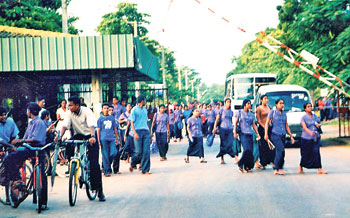| More than 300,000 employees out of a total workforce of 6.1 million employed in the private sector have lost their jobs, with more than 50,000 being dismissed during the past three months, The Sunday Times learns.
The Inter Company Employees Union charged that more than 50 companies and factories have been closed due to the present crisis situation and that the Labour Ministry has done little to protect the employees who have lost their jobs.
President of the union Wasantha Samarasinghe said the situation would get worse in the following months and it would hit the service sector which has already implemented cost cutting measures including cut back in employment.
 |
| File photo: Workers at an apparel factory |
He said despite a proposal to set up a fund under the ‘Termination of Employment of Workers Act’ four years ago, it was not implemented.
“The government should look into this matter as the private sector makes a large contribution to the productivity of the country” Palitha Atukorala, president of the Progressive Union said.
He said cutting labour costs would have a negative impact on productivity.
“The garment industry is badly affected. It is unlikely we will receive GSP benefits. Buyers are also showing hesitancy towards placing orders. During the past few months more than 15,000 people lost their jobs in the garment industry alone. Most of them were labourers earning a minimum of Rs. 6,700,” he said.
He charged that the difference between salaries paid to senior management and the normal employees was astronomical and drained the viability of these companies.
Mr. Atukorala charged most factories gave holidays to workers, who return to find the factory closed. Many of these employers avoid paying compensation nor do they justify the closure of the factories.
He said of the 832 factories set up in 2004 only 403 were in operation by 2006.
The Sunday Times learns that a leading telecom service provider with around 4,000 employees has decided to lay off a number of employees at all levels including those at senior management level.
A senior official of the company said their call centre had been badly affected while senior staff live in fear of being laid off.
“Cutting down on senior personnel is considered the best means of cost cutting. The high salaries along with vehicle and fuel allowances are turning out to be too heavy a burden for many institutions,” he said.
Meanwhile The Commissioner General of the Department of Labour W.J.L.U. Wijayaweera told The Sunday Times it was impossible to establish a ‘safety net’ as stakeholders were unable to reach an agreement on a mutually acceptable contribution to the fund.
“Employers and employees were not willing to contribute to a fund that would benefit employees if their services were to be terminated for non-disciplinary reasons. The Labour Ministry wanted to establish this fund but it could not be at government expense,” he said.
He added most countries had adopted this type of scheme to meet the developing global crisis, but contributions were from the stakeholders.
He said certain employers did not abide by the law and closed their organizations within 24 hours which left employees helpless. As commissioner he could inquire into the matter under section 6 of the act.
|

